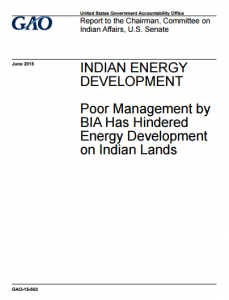Full Title: Poor Management by BIA Has Hindered Energy Development on Indian Lands
Author(s): U.S. Government Accountability Office
Publisher(s): U.S. Government Accountability Office
Publication Date: June 1, 2015
Full Text: Download Resource
Description (excerpt):
Bureau of Indian Affairs’ (BIA) management shortcomings and other factors—such as a complex regulatory framework, tribes’ limited capital and infrastructure, and varied tribal capacity—have hindered Indian energy development. Specifically, BIA does not have the data it needs to verify ownership of some Indian oil and gas resources, easily identify resources available for lease, or identify where leases are in effect, as called for in Secretarial Order 3215 and internal guidance. BIA also faces staff limitations and does not have a documented process or the data needed to track its review and response times, as called for in implementation guidance for Executive Order 13604, and therefore it cannot ensure transparency in its review of energy-related documents. These shortcomings can increase costs and project development times, resulting in missed development opportunities, lost revenue, and jeopardized viability of projects. Examples are as follows:
1.) Missed development opportunities: According to a tribal official, BIA took 18 months to review a wind lease. According to the developer of the project, the review time caused the project to be delayed and resulted in the project losing an interconnection agreement with the local utility. Without this agreement, the project has not been able to move forward, resulting in a loss of revenue for the tribe.
2.) Lost revenue: According to a tribal official, BIA’s review of some of its energy-related documents took as long as 8 years. In the meantime, the tribe estimates it lost more than $95 million in revenues it could have earned from tribal permitting fees, oil and gas severance taxes, and royalties.
3.) Jeopardized viability of projects: One lease for a proposed utility-scale wind project took BIA more than 3 years to review and approve. According to a tribal official, the long review time has contributed to uncertainty about the continued viability of the project because data used to support the economic feasibility and environmental impact of the project became too old to accurately reflect current conditions.
Several factors have deterred tribes from seeking tribal energy resource agreements (TERA). These factors include uncertainty about some TERA regulations, costs associated with assuming activities historically conducted by federal agencies, and a complex application process. For instance, one tribe asked the Department of the Interior (Interior) for additional guidance on the activities that would be considered inherently federal functions—a provision included in Interior’s regulations implementing TERA. Interior officials told GAO that the agency has no plans to provide additional clarification.
Interior’s Office of Indian Energy and Economic Development (IEED) provided grants to build tribal energy development capacity to 25 tribes from 2007 through 2013, but the effectiveness of the grants to move tribes closer to demonstrating that they have the capacity to enter into TERAs is unknown. The Standards for Internal Control in the Federal Government call for agencies to compare actual performance with planned or expected results and to monitor performance; however, IEED has not tracked how, if it all, the grants have eliminated capacity gaps.
